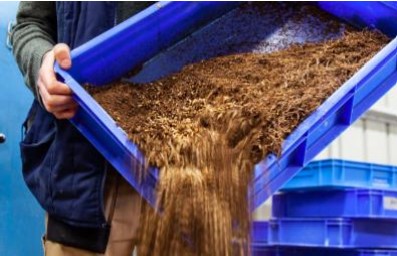BSF is a common and widespread fly of the family Stratiomyidae.
• The protein from BSF larvae provides well-balanced, highly digestible amino acid profiles that can be used as a replacement to fishmeal and soybean meal.
• BSF lifecycle includes eggs, larvae, pre-pupa, pupae and adult stages, taking around 40–45 days to complete.
• Depending on the size of the larvae, type of the substrate available, and environmental conditions (e.g., moisture, temperature, and air supply), the larvae consume from 25 to 500 mg of organic matter per larva per day.
• The food conversion ratio of BSF is estimated to be about 10-15 based on the wet weight diet as fed.
• BSF produces a high-quality protein (37-47% dry weight) and can achieve more than 60% crude protein when de-fatted, which makes it superior to soybean meal.
• BSF also maintains a consistent amino acid profile across different rearing substrates and is high in essential amino acids.
• BSF meal is high in calcium and phosphorous and high in energy (25.7 MJ/kg compared to 13-17 MJ/ kg for soybean meal).
• Extensive testing has shown that BSF is not an invasive species risk in northern climates and are not a vector of diseases for humans, animals or plants.




Discussion
Black Soldier Fly has the potential to provide a quality source of protein for both poultry and fish. Both classes of stock feed on larvae in the wild. However, UK legislation lags that of the EU and they can only be fed live to poultry (i.e. not dried). This is effectively strangling the industry and will inevitably allow the Dutch to establish as the leading European suppliers. They have already created large scale machinery. Who should I lobby?